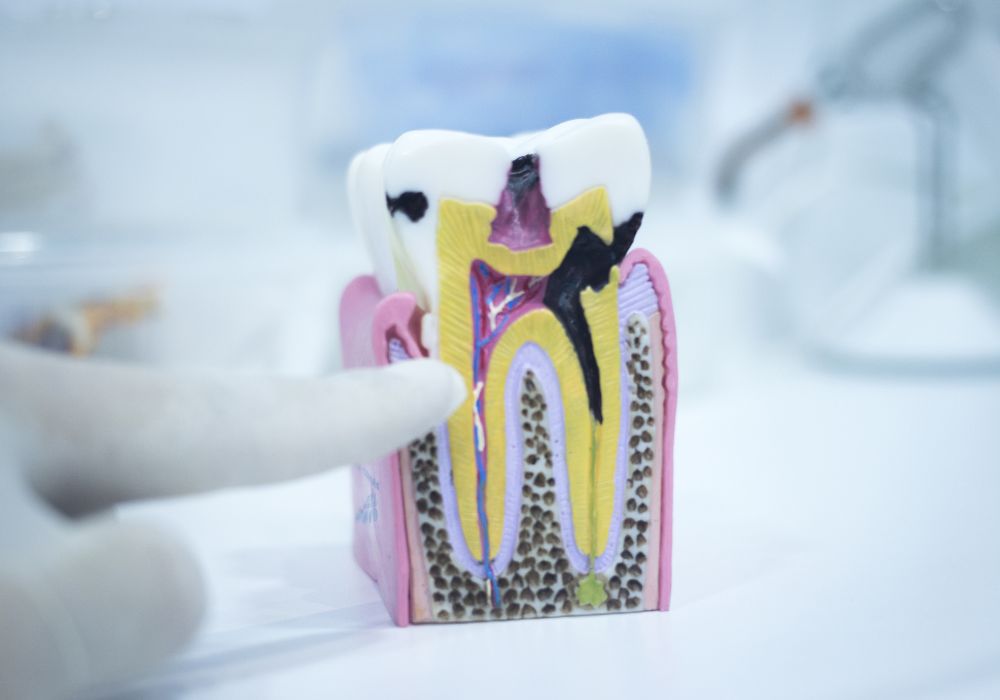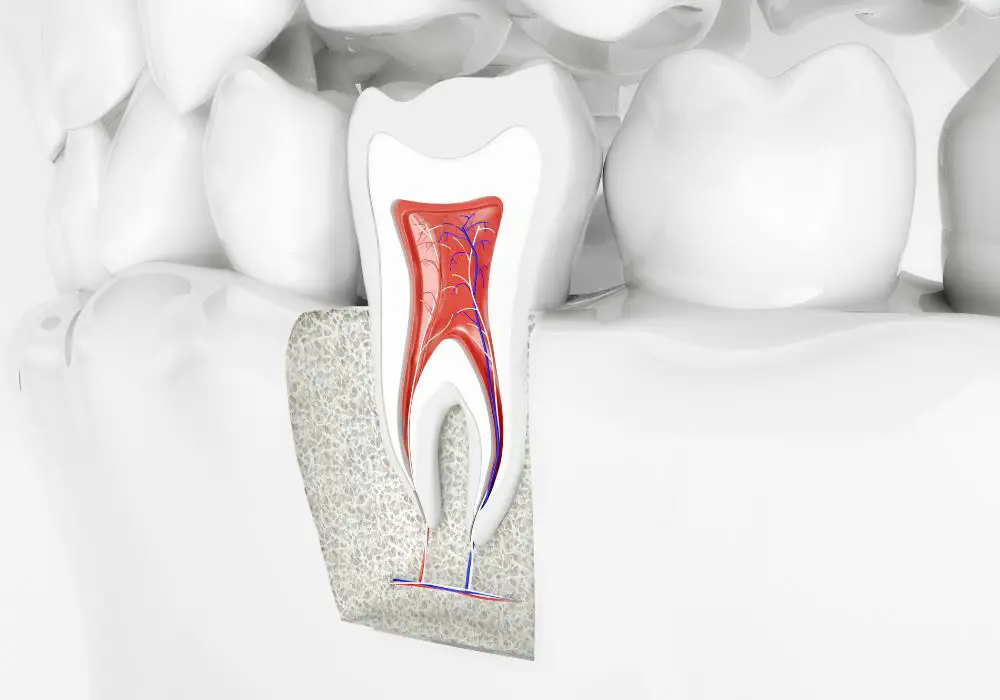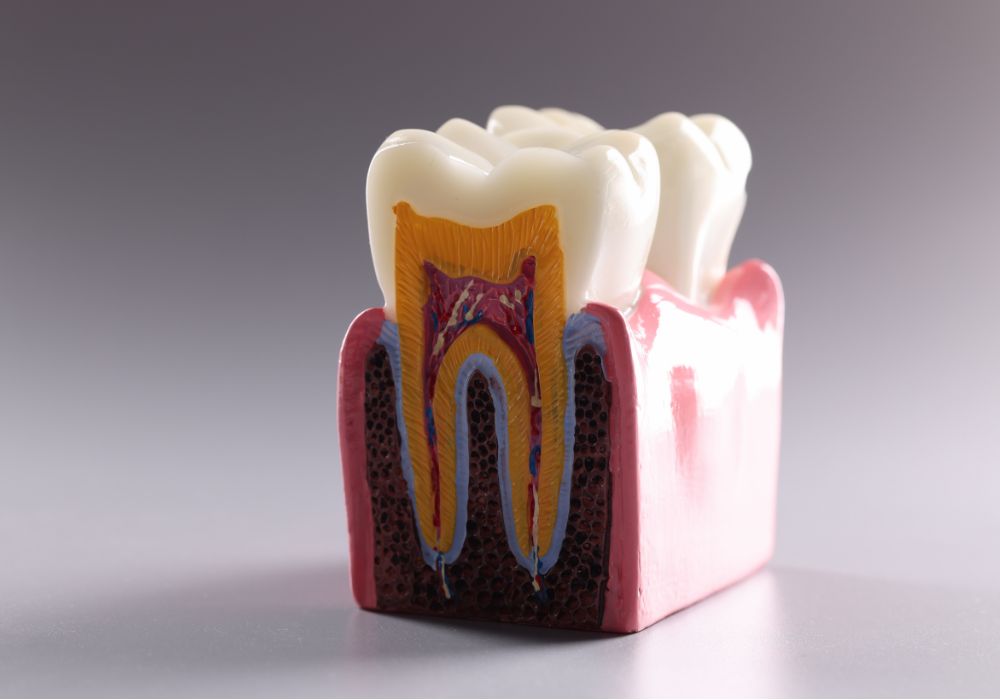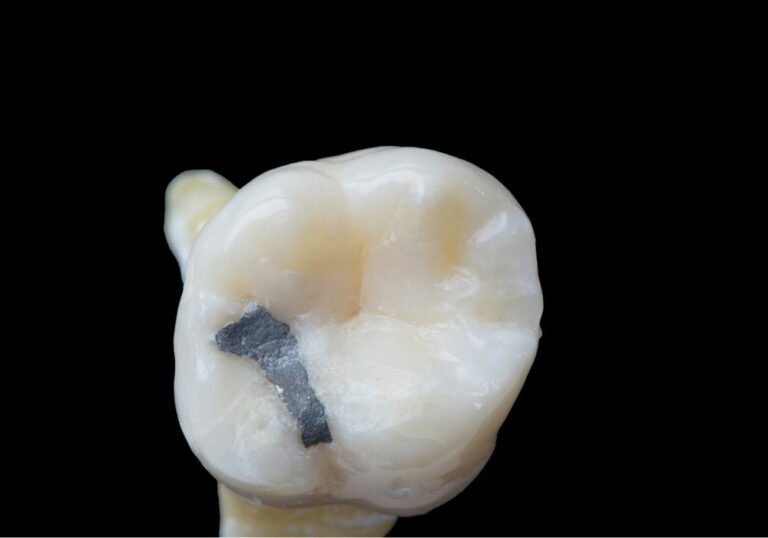Do teeth have arteries? It’s a question that may have crossed your mind at some point. After all, we know that teeth are living structures that require nutrients and oxygen to survive. So, how exactly do they get the blood supply they need?
The answer is yes, teeth do have arteries. In fact, each tooth is supplied by its own network of blood vessels and nerves. The arteries that supply the teeth are branches of the maxillary artery, which is a branch of the external carotid artery. The inferior alveolar artery and the superior alveolar arteries are responsible for delivering blood directly to the teeth.
The blood supply to the teeth is important for maintaining their health and vitality. Without adequate blood flow, the teeth can become weakened and more susceptible to decay and other dental problems. In addition, the nerves that supply the teeth are also important for detecting pain and other sensations. So, the next time you’re wondering about the inner workings of your teeth, remember that they have their own blood supply and nerve network to keep them healthy and functioning properly.
Understanding Teeth Structure
Teeth are complex structures that play an important role in our daily lives. They help us chew our food, speak clearly, and even affect our appearance. Understanding the structure of teeth can help you take better care of them and prevent dental problems.
Enamel
The outer layer of your teeth is called enamel. It is the hardest substance in your body and protects your teeth from damage. Enamel is made up of mostly minerals, such as calcium phosphate, and is translucent. It can be damaged by acid erosion from sugary or acidic foods and drinks, leading to cavities. Brushing your teeth twice a day with fluoride toothpaste can help strengthen your enamel and prevent cavities.
Dentin
Underneath the enamel is the dentin, which is a softer layer of the tooth. It is made up of living cells called odontoblasts and contains tiny tubules that connect to the nerves in the pulp. Dentin can be exposed if the enamel is worn away, leading to tooth sensitivity.
Pulp
The pulp is the innermost layer of the tooth and contains blood vessels, nerves, and connective tissue. It is responsible for supplying nutrients and oxygen to the tooth and sensing temperature and pain. If the pulp becomes infected or inflamed, it can lead to a toothache or even an abscess. Root canal therapy may be necessary to remove the infected pulp and save the tooth.
In summary, teeth have a complex structure that includes enamel, dentin, and pulp. Taking care of your teeth with proper brushing and dental care can help keep them healthy and prevent dental problems.
Arteries and Their Function
Teeth are complex structures consisting of multiple layers, including the enamel, dentin, and pulp. While they may seem like static structures, they are actually living tissues that require a constant supply of nutrients and oxygen to remain healthy. This is where arteries come in.
Arteries are blood vessels that carry oxygenated blood from the heart to various parts of the body, including the teeth. In the case of teeth, there are several arteries that supply them with blood, including the maxillary and inferior alveolar arteries.
The maxillary artery is a branch of the external carotid artery and is responsible for supplying blood to the upper teeth and surrounding tissues. It gives off several branches, including the posterior superior alveolar artery, which supplies blood to the upper molars, and the infraorbital artery, which supplies blood to the upper front teeth.
The inferior alveolar artery, on the other hand, is a branch of the mandibular division of the maxillary artery and supplies blood to the lower teeth and surrounding tissues. It gives off several branches, including the mental artery, which supplies blood to the lower front teeth, and the incisive artery, which supplies blood to the lower premolars and canine teeth.
The function of these arteries is to provide the teeth with the necessary nutrients and oxygen to maintain their health and vitality. Without adequate blood supply, the teeth can become weakened and susceptible to decay, infection, and other dental problems.
In addition to supplying blood, arteries also play a role in regulating blood pressure and maintaining overall cardiovascular health. By ensuring that the teeth receive a steady supply of oxygenated blood, they help to promote overall health and well-being.
Blood Supply in Teeth

Teeth are complex structures that require a constant supply of oxygen and nutrients to remain healthy. The blood supply to teeth is critical, as it provides the necessary nutrients and oxygen to maintain their vitality.
Role of Arteries
Arteries play a crucial role in the blood supply to teeth. They carry oxygenated blood from the heart to the teeth, providing the necessary nutrients and oxygen to maintain their vitality. The arteries also transport waste products away from the teeth, ensuring that they remain healthy.
Arteries in Different Parts of Teeth
Different parts of teeth have varying degrees of blood supply. The pulp, which is the innermost part of the tooth, has a rich blood supply, as it contains nerves and blood vessels. The dentin, which is the layer beneath the enamel, also has a blood supply, but it is less extensive than that of the pulp. The enamel, which is the outermost layer of the tooth, does not have a blood supply, as it is composed of dead cells.
The arteries that supply blood to teeth are branches of the external carotid artery. The inferior alveolar artery and the superior alveolar arteries are the branches of the maxillary artery that feed the teeth directly. The maxillary artery is a branch of the external carotid artery that supplies blood to the maxilla, which is the upper jawbone.
In conclusion, the blood supply to teeth is critical for their health and vitality. Arteries play a crucial role in providing the necessary nutrients and oxygen to maintain the health of teeth. Different parts of teeth have varying degrees of blood supply, with the pulp having the richest blood supply. The arteries that supply blood to teeth are branches of the external carotid artery.
Implications of Arteries in Teeth
Tooth Health
The arterial supply to the teeth is essential for their health and survival. The inferior and superior alveolar arteries, which are branches of the maxillary artery, supply the teeth with oxygen and nutrients. If the arterial supply is disrupted due to trauma or injury, the tooth may become necrotic and eventually die. This can lead to a host of dental problems, including infection, abscess, and tooth loss.
Maintaining good oral hygiene is crucial for the health of your teeth and their arterial supply. Brushing and flossing regularly can help prevent the buildup of plaque and tartar, which can lead to gum disease and other dental problems. Regular dental cleanings and check-ups can also help detect and treat any dental issues before they become more serious.
Dental Procedures
Dental procedures, such as root canals and extractions, can also affect the arterial supply to the teeth. During a root canal, the infected or damaged pulp inside the tooth is removed, along with the arterial supply. The tooth is then filled and sealed to prevent further infection. In some cases, a crown may be placed over the tooth to provide additional support and protection.
During an extraction, the tooth and its arterial supply are completely removed from the mouth. This can lead to some bleeding and discomfort, which can be managed with proper aftercare and pain medication.
It is important to follow your dentist’s instructions for aftercare following any dental procedure to ensure proper healing and prevent any complications. If you experience any unusual pain or bleeding, contact your dentist immediately.
In conclusion, the arterial supply to the teeth is essential for their health and survival. Maintaining good oral hygiene and following proper aftercare instructions for dental procedures can help ensure the health of your teeth and their arterial supply.
Arteries and Oral Health

Your oral health is linked to many other aspects of your overall health, including your cardiovascular health. Gum disease, also known as periodontal disease, is a common oral health problem that can have serious implications for your arteries and heart health.
Studies have shown that people with poor oral health, including gum disease, have higher rates of cardiovascular problems such as heart attack or stroke than those with good oral health. Gum disease begins when plaque builds up around your teeth, which is a sticky, bacteria-laden film that can also build up in your arteries.
When plaque builds up in your arteries, it can lead to a condition called atherosclerosis, which is a hardening and narrowing of your arteries. This can make it more difficult for blood to flow through your arteries, increasing your risk of heart attack or stroke.
In addition to plaque buildup, gum disease can also cause inflammation in your body, which can contribute to the development of atherosclerosis. This inflammation can also increase your risk of other health problems, such as diabetes and cancer.
To protect your oral health and reduce your risk of cardiovascular problems, it’s important to practice good oral hygiene. This includes brushing your teeth at least twice a day for two minutes each time, using a soft-bristled brush and fluoride toothpaste. You should also floss daily and use mouthwash to remove any food particles left after brushing and flossing.
Eating a healthy diet that is low in sugar and high in fruits and vegetables can also help protect your oral and cardiovascular health. Avoiding tobacco products is also important, as smoking can increase your risk of gum disease and other health problems.
By taking care of your oral health, you can help protect your arteries and reduce your risk of cardiovascular problems.
Diseases Related to Arteries in Teeth
If you are wondering whether teeth have arteries, the answer is no. Teeth do not have arteries, but they do have blood vessels and nerves that are responsible for keeping them healthy. However, there are diseases related to arteries in teeth that can affect your oral health.
Pulpitis
Pulpitis is a condition that occurs when the dental pulp, which is the soft tissue inside the tooth, becomes inflamed. This can happen as a result of tooth decay, trauma, or other factors. When the pulp becomes inflamed, it can cause pain, sensitivity, and swelling in the affected tooth.
There are two types of pulpitis: reversible and irreversible. Reversible pulpitis is a mild form of the condition that can be treated with a filling or other dental procedure. Irreversible pulpitis is a more severe form of the condition that requires a root canal to remove the damaged pulp and save the tooth.
Periodontal Disease
Periodontal disease is a chronic inflammatory condition that affects the tissues surrounding and supporting the teeth. It is caused by bacteria in dental plaque that build up on the teeth and gums. If left untreated, periodontal disease can lead to tooth loss and other serious health problems.
There are two main types of periodontal disease: gingivitis and periodontitis. Gingivitis is a milder form of the condition that causes redness, swelling, and bleeding in the gums. Periodontitis is a more advanced form of the condition that can cause the gums to recede, the teeth to become loose, and the bone supporting the teeth to deteriorate.
To prevent periodontal disease, it is important to practice good oral hygiene, including brushing and flossing regularly and visiting your dentist for regular checkups and cleanings. If you have periodontal disease, your dentist may recommend treatments such as scaling and root planing, antibiotics, or surgery to help control the condition.

Frequently Asked Questions
What is the blood supply to teeth?
Teeth receive blood supply through the dental artery, which is a branch of the maxillary artery. The dental artery enters the tooth through the apical foramen and supplies blood to the pulp and surrounding tissues.
How are teeth attached to the jaw bone?
Teeth are attached to the jaw bone by the periodontal ligament, which is a group of fibers that connect the cementum of the tooth to the alveolar bone of the jaw. This ligament helps to keep the tooth in place and allows for slight movement during chewing.
What is dental artery?
The dental artery is a branch of the maxillary artery that supplies blood to the teeth and surrounding tissues. It enters the tooth through the apical foramen and provides blood to the pulp and surrounding tissues.
Do teeth have their own blood and nerve supply?
Yes, teeth have their own blood and nerve supply. The dental artery supplies blood to the teeth and surrounding tissues, while the dental nerve provides sensory and motor innervation to the teeth.
Do teeth need blood supply?
Yes, teeth need blood supply to stay healthy. The blood supply provides nutrients and oxygen to the teeth and surrounding tissues, and helps to remove waste products.
What is the nerve supply of maxillary teeth?
The maxillary teeth are innervated by the superior alveolar nerves, which are branches of the maxillary division of the trigeminal nerve. These nerves provide sensory innervation to the teeth and surrounding tissues.






